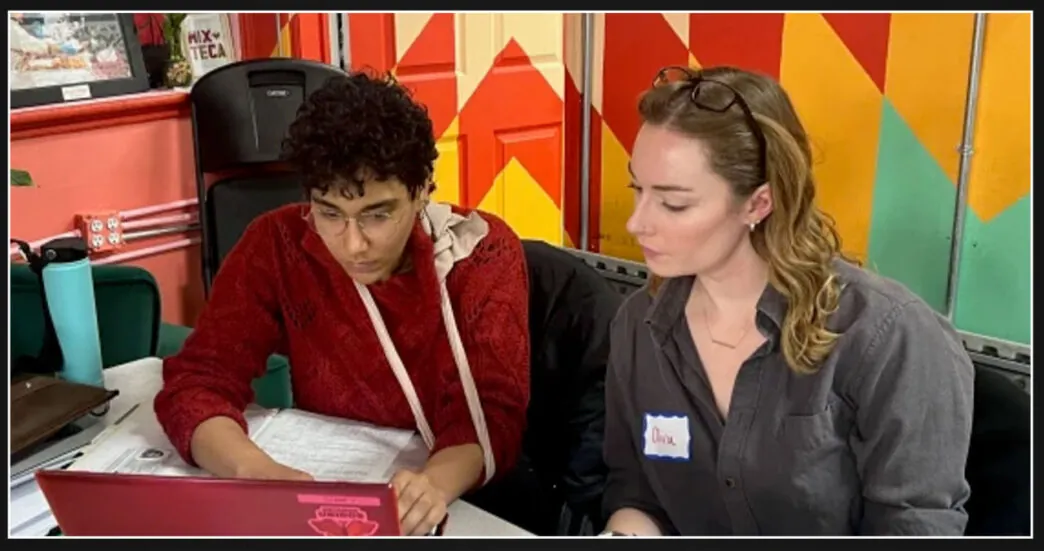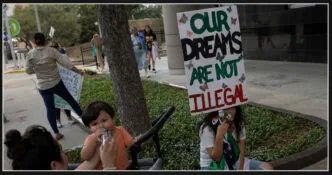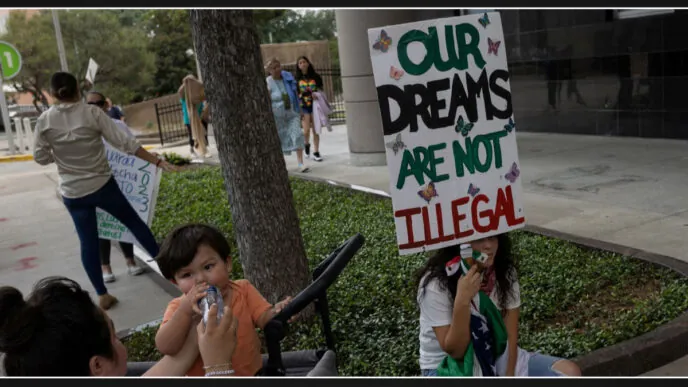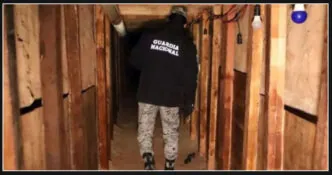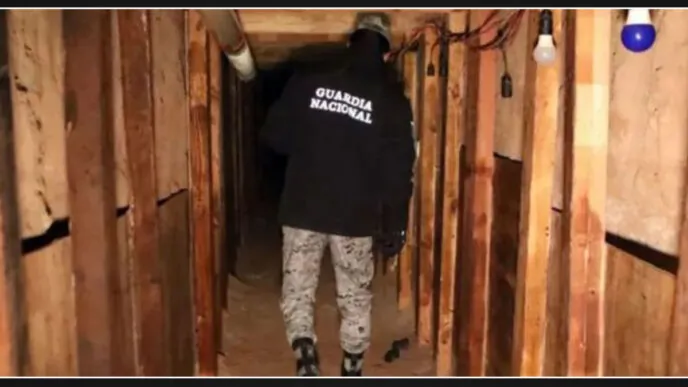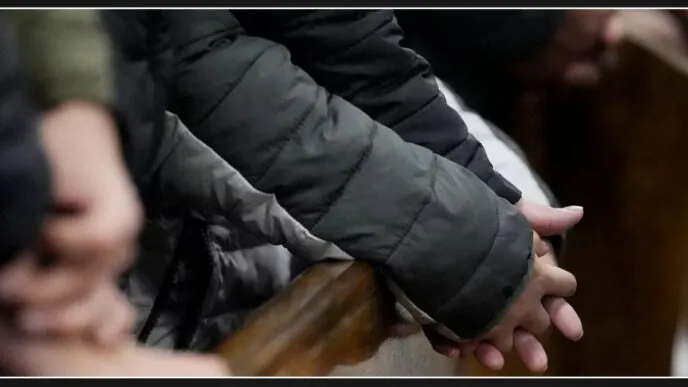South Brooklyn Sanctuary is bustling on a Monday evening in January, as numerous volunteers, translators, and migrants gather. The migrants are seeking answers to pressing questions. They want to know what the incoming Trump administration means for their pending asylum cases. They are also seeking guidance on how to fight deportation orders. In the worst-case scenario, they want to be prepared for family separation.
As President-elect Donald Trump’s inauguration approaches, there is a growing fear among many that he will follow through on his campaign promise of implementing widespread deportations. This fear is particularly pronounced among the 210,000 undocumented individuals who have arrived in New York City since 2022. They are also facing additional challenges, such as Mayor Eric Adams’ plan to close the Floyd Bennett Field shelter, which currently provides housing for 1,800 people. Furthermore, Adams has threatened to roll back the city’s sanctuary policies by overriding the City Council’s opposition through an executive order. In light of these developments, discussions have taken place between incoming Trump administration officials and Adams regarding the deportation of migrants who have committed crimes.
Emily Schectman, the director of South Brooklyn Sanctuary, stated that their organization is taking proactive measures to prepare for the uncertainties that lie ahead. Over the past few weeks, they have witnessed a surge in the number of new volunteers, with 150 sign-ups already and more expected after the inauguration. Schectman anticipates an increased focus on deportation defense, monitoring activities related to ICE, and working towards preventing family separations.
South Brooklyn Sanctuary is just one of many organizations nationwide that function as a pro se community, offering support and guidance to migrants who wish to represent themselves in the legal system. Since its establishment in 2022, this nonprofit has assisted more than 5,000 migrants, benefiting from the commitment and expertise of over 100 dedicated volunteers. In the past year alone, they have successfully assisted 715 migrants in filing change-of-address forms, ensuring they do not miss any court dates that could potentially lead to deportation.
Once he assumes office, Trump has made a commitment to implement the “most extensive deportation program in American history,” present a bill to Congress to outlaw sanctuary cities, and request funding to hire and retain 10,000 additional border agents. Additionally, he has expressed his intention to limit federally funded benefits exclusively to American citizens and to reinstate and broaden a travel ban targeting countries with a Muslim majority. In a December interview with NBC’s “Meet the Press,” Trump asserted that he had “no alternative” but to deport millions of people, arguing that they are “costing us a fortune.” However, economists have contested this claim.
South Brooklyn Sanctuary is currently raising funds to hire a full-time staff attorney and establish a new program. This program will assist migrants in filing motions to reopen their asylum cases, providing a valuable resource to combat removal orders. Additionally, the organization is expanding into a new space this month to accommodate the increasing number of migrants from African countries. In this new space, a new cohort of volunteers who are fluent in French and Arabic will be trained to better serve the needs of these individuals.
“We assure the community that we will stay informed and ready to adapt to any upcoming policy changes,” she emphasized.
Training volunteers to support migrants
Emelis, a Venezuelan citizen who prefers to remain anonymous due to concerns about deportation, shared her story of leaving her home country. She decided to flee Venezuela after her involvement in high school protests against President Nicolás Maduro led to her being targeted by the military.
When she arrived at the South Brooklyn Sanctuary’s walk-in migration program at Good Shepherd Church in Bay Ridge, the 26-year-old was running out of time to apply for asylum. It was crucial for her to submit her asylum and work permit forms within a year of her arrival in the United States. Thankfully, with the assistance of volunteers, she was able to complete the necessary paperwork just in time.
Emelis expressed her initial feelings of fear upon her arrival, but she was relieved to receive her work permit in just about a month.
South Brooklyn Sanctuary originated as a response to the actions of Texas Gov. Greg Abbott, who transported more than 27,300 migrants to New York. The governor justified this decision by emphasizing the importance of border security. Since 2020, over 8 million migrants have crossed the U.S.-Mexico border due to various reasons such as political suppression, gang violence, poverty, and natural disasters. Many of these individuals have settled in immigrant hubs located in large cities, which faced challenges in rapidly expanding their safety nets. However, it is worth noting that by 2024, there has been a decrease in both border crossing numbers and new migrant arrivals to New York City and other major metropolitan areas.
In Brooklyn, Pastor Juan Carlos Ruiz of the Good Shepherd Church and local residents warmly embraced their new neighbors by offering a weekly walk-in program. This program provided valuable information on immigration, along with hot meals and clothing. As time went on, they realized that in addition to practical support, migrants also needed to be educated about their rights.
Legal clinics in New York City and other cities were struggling to handle the high number of migrants seeking free legal representation. The Migrant Solidarity Mutual Aid Network in Washington, D.C., and Mountain Dreamers in Frisco, Colorado, were among the organizations that emerged to provide assistance to migrants in filling out asylum and employment authorization applications, in the absence of support from local government and nonprofit services.
In New York, the city’s official asylum center imposes strict limitations on scheduling asylum application appointments. To be eligible, migrants must be in the city’s shelter system, possess work authorization, and have been in the country for less than 11 months. Unfortunately, even those who manage to appear in immigration court often find themselves unprepared and without legal representation. Shockingly, nearly 44% of immigrants in New York state are left to fight their cases alone, lacking English proficiency, knowledge of their rights, or any legal training.
Schectman emphasized the need for a strong pro se community to address the justice gap in cases where individuals lack legal representation.
Preparing for the policy changes ahead
Maria Meneses, 45, volunteered with South Brooklyn Sanctuary last summer to share the advice that had once benefited her. As an asylum recipient herself, she understands the challenges and wants to provide support to others in similar situations.
As an empathetic listener, Meneses empathizes with asylum applicants, acknowledging the traumas they bear. She encourages them to provide evidence of any violence or abuse they may have experienced, assuring them of the importance of documenting their experiences, even if it may be uncomfortable for them.
Meneses stressed the significance of asylum-seekers providing detailed information about the specific gang that posed a threat to them and the towns where it operates. She highlighted the fact that these gangs often have deep-rooted connections with the government, making them powerful economic and political entities. In this context, it can be argued that resisting these gangs can result in persecution by the government.
Meneses acknowledges that her personal experience as a volunteer has made her effective in her role. However, she also acknowledges that it can take an emotional toll on her. She expresses empathy for the families she works with, noting that they have invested all their hopes and dreams into the asylum process. She recognizes the difficult task they face in recounting the traumatic events that led them to leave everything behind.
But the fact that South Brooklyn Sanctuary’s volunteer pool has more than doubled in the past three months gives her hope. She finds it inspiring to witness the dedication of New York City residents in supporting their community.
Emelis is currently establishing her life in New York. In 2023, she obtained a work permit and secured a position as a home attendant through a temp agency. Despite working evening shifts, she manages to spend quality time with her son and brothers. Emelis expressed her desire to provide her son with a brighter future in this new environment.
This Article Includes

